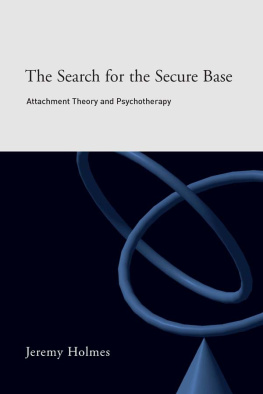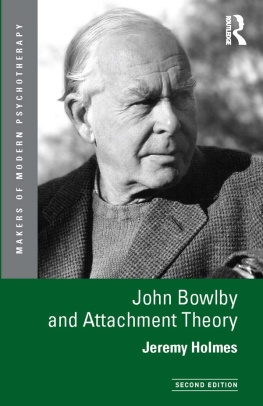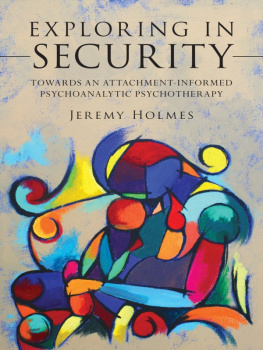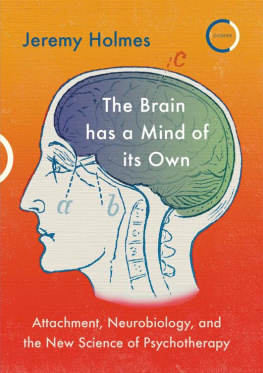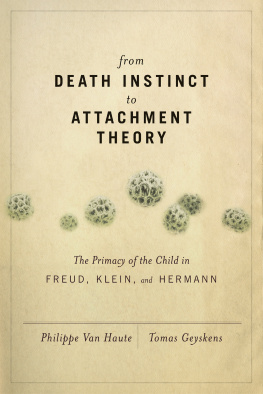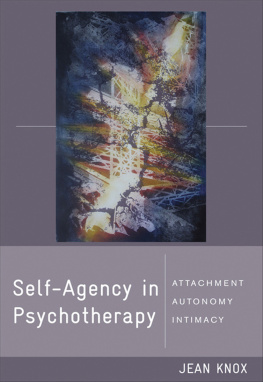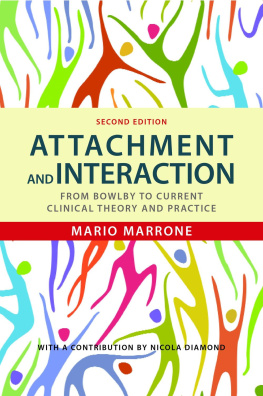The Search for the Secure Base
In recent decades, attachment theory has gained widespread interest and acceptance. However, the relevance of attachment theory to clinical practice has never been clear. With The Search for the Secure Base, attachment becomes for the first time a therapeutic modality in its own right.
The Search for the Secure Base introduces an exciting new attachment paradigm in psychotherapy with adults, describing the principles and practice of attachment-informed therapy in a way that will be useful to beginners and experienced therapists alike. Based on the scientific foundations of attachment theory and research, Jeremy Holmes identifies the areas within which attachment-informed therapy operates, including secure base, exploration and pleasure, anger and protest, and loss. Therapeutic techniques include providing a secure base, methods of listening and responding, facilitation of emergent meaning, and reflexive practice. Jeremy Holmes uses a wide range of clinical and literary examples to illustrate these techniques, and discusses topics such as basic fault, the intergenerational transmission of attachment insecurity and working with traumatized and abused clients. Viewing attachment-based therapy as a variant of object relations, the book argues strongly for a rapprochement between psychoanalysis and attachment theory.
The Search for the Secure Base will be welcomed by practitioners and trainees in Psychotherapy, Psychoanalysis, Psychiatry, Psychology, Counselling, Social Work and Nursing.
Jeremy Holmes is Consultant Psychotherapist in North Devon and Senior Lecturer in Psychotherapy in the University of Exeter. He is current chair of the psychotherapy faculty of the Royal College of Psychiatrists. He is the author of over 100 papers and book chapters as well as 12 books, including the acclaimed John Bowlby and Attachment Theory and Introduction to Psychoanalysis, with Anthony Bateman.
The Search for the Secure Base
Attachment theory and psychotherapy
Jeremy Holmes
First published 2001 by Routledge
27 Church Road, Hove, East Sussex BN3 2FA
Simultaneously published in the USA and Canada
by Routledge
711 Third Avenue, New York, NY 10017
2001 Jeremy Holmes
Routledge is an imprint of the Taylor & Francis Group,, an Informa business
Typeset in Sabon by RefineCatch Limited, Bungay, Suffolk
Cover design by Jim Wilkie
All rights reserved. No part of this book may be reprinted or reproduced or utilised in any form or by any electronic, mechanical, or other means, now known or hereafter invented, including photocopying and recording, or in any information storage or retrieval system, without permission in writing from the publishers.
This publication has been produced with paper manufactured to strict environmental standards and with pulp derived from sustainable forests.
British Library Cataloguing in Publication Data
A catalogue record for this book is available from the British Library
Library of Congress Cataloging in Publication Data
Holmes, Jeremy.
The search for the secure base : attachment theory and
psychotherapy / Jeremy Holmes
p. cm.
Includes bibliographical references and index.
ISBN 1583911510 ISBN 1583911529 (pbk.)
1. Attachment behaviour. 2. Security (Psychology) 3. Psychotherapy. 4. Psychotherapist and patient. 5. Object relations (Psychoanalysis) I. Title.
RC455.4.A84 H657 2000
616.8914 dc21 |
00054664 |
ISBN: 9781583911518 (hbk)
ISBN: 9781583911525 (pbk)
Contents
Figures
Tables
Finding a title for a book is rather like naming a baby. After the evanescent pleasures of conception, there follows a long period of gestation, usually a mixture of excited anticipation, some discomfort and eventual hard labour. Then the moment comes when a name becomes a necessity. I first thought, provocatively, of Why I am not a Psychoanalyst, but soon rejected it the book assumes common ground between attachment theory and psychoanalysis, not an implied fight. Next I considered Thinking about Listening. The ability to listen and think at the same time is clearly what psychotherapists do; attachment theory understands that process, since secure attachment arises out of the ability of parents to see the child as a thinking being in its own right, and to think about themselves as care-givers and their impact on their dependents. One of the key hypotheses of this book is that what good therapists do with their patients is analogous to what successful parents do with their children. So Thinking about Listening was right in principle, but as a phrase somehow seemed too bland and unfocused. Finally, when I settled on The Search for , I was torn between a Secure Base and the Secure Base. The difference may seem minuscule but the latter implies a universal psychic entity comparable to the good breast or the holy grail, whereas the former suggests a more historically immediate struggle for consensus in the psychological sciences. In the end, I opted for the as conferring greater authority on the secure base concept, but both senses are implicit in the book.
There has been an explosion of interest in the ideas and research findings that collectively comprise contemporary attachment theory over the past decade. The culmination of this research aspect is Cassidy and Shaver's (1999) magnificent compilation. Attachment ideas have perhaps been slower to percolate through to clinicians, especially those working with adults, but here too the field has changed, and these days attachment seems to be on everyone's lips. My own perspective is unashamedly clinical, this being my third attempt at writing a book about attachment in the past 10 years. I started with a biography and exposition of the ideas of John Bowlby who, with Mary Ainsworth, was the originator of attachment theory (Holmes 1993). This was followed by a collection of essays linked by the attempt to show how attachment theory, whose main clinical applications had been to work with children and families, could inform and guide the practice of psychotherapy with adults, mainly in psychiatric settings (Holmes 1996). The present volume is in a sense a continuation of that project, but here I try to grapple more intensely with the connections and separations between psychoanalysis and attachment theory, and develop the theme of narrative as a bridging concept that brings together clinical practice, attachment research and the psychoanalytic tradition.
One of the paradoxes of psychology and psychotherapy is that although the seminal ideas in the field generally aspire to universality, more than other branches of science they often reflect both the personality of their inventors and the Zeitgeist within which they were working reassuring perhaps for those who believe in counter-transference. Certainly, my own combination of avoidance and ambivalence has meant that I have oscillated in my relationship to psychoanalysis ever since it swam into my ken, being both deeply attracted by it and suspicious of its insights and mysteries. Attachment theory is where I seem to have found a home, a theory that was, at least in its origins, itself ambivalent in its relationship to psychoanalysis. But I am by nature an integrator, a quality that no doubt, to some extent, reflects a certain cowardice and inability to own healthy aggression, but also has virtues when no single undisputed psychological paradigm reigns supreme. What I write is necessarily coloured not just by personal strengths and weaknesses, but the necessarily integrative context in which I work as a consultant psychiatrist in psychotherapy, primarily in the National Health Service.
Next page
